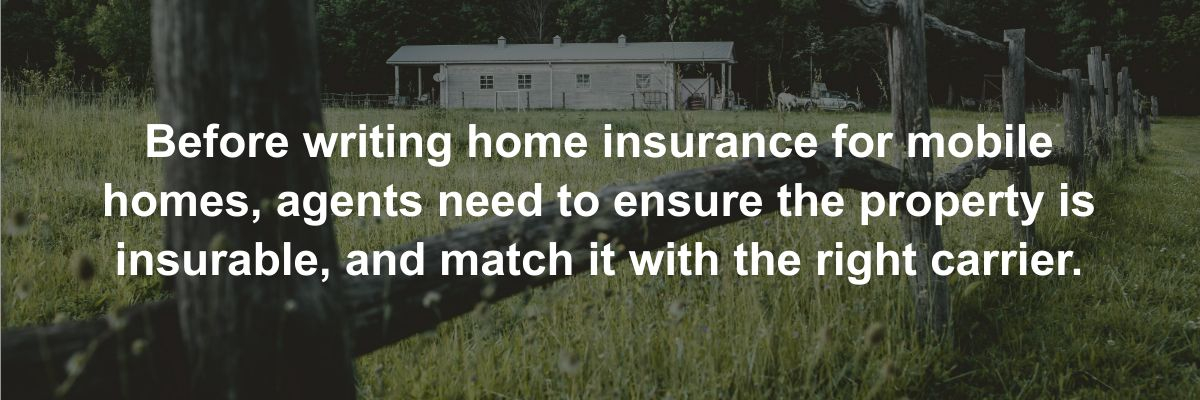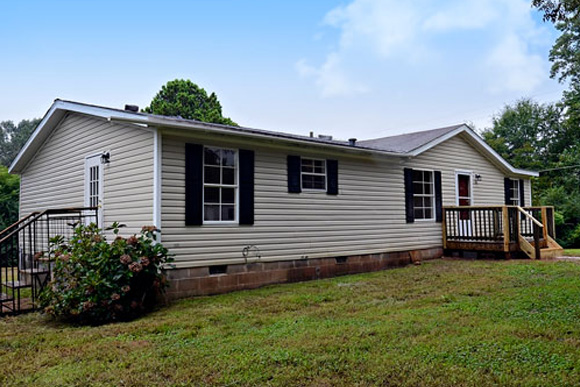Home insurance for mobile homes requires a different set of tools than traditional property coverage.
From policy structure and valuation to underwriting quirks and wildfire exposure, agents need a clear strategy to evaluate risk and match clients with the right protection.
This guide covers what agents need to know to confidently write home insurance for mobile homes and avoid common pitfalls that cause delays or gaps in protection.
Special Considerations for Mobile Homes in Rural Areas
Mobile homes in rural areas often face challenges in securing home insurance because of the following considerations:
- Wind, hail, and wildfire risks are higher in remote areas
- Limited fire protection (e.g., hydrants, response times) can increase premiums or limit carrier availability
- Proper setup—tie-downs, skirting, permanent foundations—may be required for eligibility
- Flood and earthquake coverage must often be added via a separate policy or via endorsement
- Local permitting and zoning requirements may apply so always confirm site compliance before quoting
How to Evaluate a Mobile Home Before Quoting Coverage
One benefit of working with an MGA like Stroud, is that we can guide you in the process of securing the best policy for your client’s needs.

Start with the basic underwriting review:
- Request photos or conduct a walkthrough to assess condition and upkeep
- Confirm occupancy type: owner-occupied, seasonal, rental, or used by hired hands
- Check distance to the nearest fire protection, including fire departments, fire hydrants and/or bodies of water
- Verify tie-downs, skirting, and compliance with installation standards
- Determine the valuation method and eligibility for replacement cost based on the home’s age and condition
- Understand the location’s storm, wind, and wildfire exposure
- Identify whether the mobile home is part of a broader farm or ranch operation
Ask your client:
- What is the insurance coverage history for the mobile home, and have there been any past claims?
- Is the mobile home financed?
- Will the mobile home be moved, and do they need coverage while it’s in transit?
- Are there valuable assets like jewelry or art stored inside the mobile home that will require personal property insurance?
Writing Home Insurance for Mobile Homes on Farm & Ranch Policies
When mobile homes are located on properties with agricultural operations, agents may have the opportunity to combine mobile home insurance with a farm and ranch insurance package.
When it might make sense to combine:
- The home and farm are on the same parcel of land
- One carrier can cover all exposures (dwelling, equipment, liability, personal property)
- You want coordinated billing, claims, and updates
- The client prefers integrated protection across the operation
When it might make sense to separate:
- The farm carrier excludes mobile home coverage
- The home is used by hired hands, renters, or non-family
- It’s on a different parcel or in a distinct risk zone
- Specialized coverage (e.g., transit or unique endorsements) is needed
Stroud underwriters can help guide independent insurance agents based on carrier requirements and risk setup.
Avoid These Common Pitfalls in Home Insurance for Mobile Homes
Even experienced agents run into issues, so be prepared to avoid these common mistakes:
- Improper valuation: Use realistic replacement cost figures; avoid underestimating or misclassifying, which can lead to insufficient coverage.
- Overlooked attached features: Failing to include attached porches, decks, skirting, steps, ramps, or permanent awnings and canopies in the home’s replacement value.
- Unlisted outbuildings: Not separately insuring detached garages, sheds, or other stand-alone structures under the policy’s “other structures” coverage.
- Occupancy misalignment: Clearly identify if the home is owner-occupied, rented, or used seasonally.
- Misassumed coverage type: Many older homes qualify only for actual cash value, not replacement cost. Check carrier guidelines, especially after 10 years.
- Coverage gaps in split policies: When the farm and mobile home are on separate policies, coordinate carefully to ensure full liability and property coverage across both.
- Fire zone blind spots: Carriers vary in wildfire exposure appetite. Always verify eligibility in Tier 1, Tier 2, and high-risk wildfire areas.
Ready to Place Insurance for Mobile Homes?
Whether you’re quoting a standalone manufactured home or one on a working ranch, home insurance for mobile homes requires attention to detail and the right carrier match.
Stroud National Mobile Home Carrier Appetite Reference
| Carrier | Coverage type | Highlights |
|---|---|---|
| Aegis General Insurance Agency | Standalone policy | - Homes 1960 or newer - All protection classes are acceptable - Owner, seasonal, rental, and tenant occupancies - Replacement cost available on new units (up to 20 yrs; 40 yrs in AZ) - Located in park or private land - Multiple rentals allowed on one policy - Max: $450K TIV / $300K Cov. A (varies by geography) - No transit coverage - Coverage is premises only and the liability does not extend to surrounding land |
| Travelers Agribusiness | Farm & Ranch (admitted) | - Requires foundation - Evaluated on a case-by-case basis - Mobile homes over 10 years old will qualify for ACV coverage - Homes in town (off farm location) can be considered - Mobile homes as employee housing can be considered - Photos appreciated (required on mobile homes 20 years or older) |
| Liberty Mutual | Farm & Ranch (admitted) | - Mobile homes over 5 years old will qualify for ACV coverage - Homes in town (off farm location) can be considered - Mobile homes as employee housing can be considered - Photos appreciated (required on mobile homes 20 years or older) |
| ARU | Farm & Ranch (non-admitted) | - All occupancy types acceptable (excluding short-term rentals and vacant) - All ages accepted (replacement cost available for homes under 5 years old) - Must be permanently fixated with underpinning - Photos appreciated (required on mobile homes 20 years or older) |
Submit a quote request today or reach out to our team to talk through your next risk. We’re here to help you quote faster and protect your clients with confidence.

